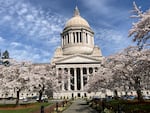
The Washington state Capitol in Olympia.
Austin Jenkins / Northwest News Network
A Washington committee tasked with studying the state’s transparency laws could be resuscitated under a bill proposed by a Southwest Washington lawmaker.
The Sunshine Committee, which the Legislature formed in 2007 to review the state’s public records laws, has been beleaguered by concerns lawmakers simply ignore. The proposal from Sen. Jeff Wilson, R-Longview, would require a committee hearing in the House and Senate every session.
The committee produces a report annually that, according to one former member, lawmakers often use as the basis of new laws or a hearing. Neither happened last year. The law currently doesn’t mandate a hearing.
Wilson and a current committee member said the proposed bill would ensure lawmakers listen to the committee.
“I’m going to let the Sunshine Committee — their voice and their annual report — be heard,” Wilson said in an interview.
Concerns came to a pitch at the committee during last year’s session. In February, committee member and public records attorney Kathy George resigned in frustration, as first reported by The Seattle Times.
“We weren’t accomplishing anything. And I put a lot of work into the Sunshine Committee,” George told OPB.
In Washington, the state’s Public Records Act makes many government records available to the public to give insight into how decisions are made and how taxpayer money is spent.
But lawmakers also often create exemptions to the act, effectively shielding records from the public eye. Today, there are more than 600 exemptions.
Often, records are exempted to protect sensitive information. Part of the committee’s annual report is to determine if exemptions work as intended.
“Oftentimes these exemptions get passed at the request of special interests or at the request of (government) agencies, and haven’t served their intended purpose,” George said, “or have had greater impact on public access than anyone anticipated.”
The discussion around the Sunshine Committee occurred around the same time a broader transparency issue hit the public stage. Washington lawmakers and public agencies have faced scrutiny for using the so-called “legislative privilege” to prevent disclosing records.
Some state lawmakers and proponents of legislative privilege say it is enshrined in Washington’s Constitution. The clause in the Constitution states that lawmakers are not liable for civil action or criminal prosecution “for words spoken in debate.” However, transparency advocates argue that the document doesn’t cover written communications like emails.
On Wednesday, the news organizations McClatchy and Crosscut reported that officials at the state’s Department of Revenue — the state’s chief tax collector — had an internal policy to use legislative privilege to blot out certain records.
Wilson said his bill doesn’t address the use of legislative privilege because that is a constitutional question. But, he said, he considered his bill a quick fix for the Sunshine Committee so it can take on a greater role in such discussions.
“Under the theme of being open and transparent, it’s important I drop this bill,” he said.
George, a board member for Washington’s Coalition for Open Government, said the bill is a step in the right direction, but it might still not move the needle.
“At least guaranteeing that recommendations are heard, there’s an opportunity for members of the public to show up and say, ‘You should act on this,’” George said. “That’s an improvement over what we had last year, where a year’s worth of work was absolutely ignored.”